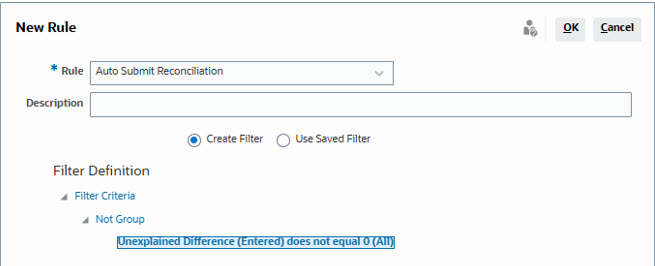Example: Defining Rules
You want to create a profile rule that automatically submits a reconciliation if the unexplained difference for all currencies is zero.
Note that when filtering against an attribute with a source type of Balance, and with multiple currencies, a filter condition returns True if any of the currencies match the filter condition. For example, a filter with Attribute set to Unexplained Difference (Entered) and Currency set to All, will return True if the reconciliation has unexplained difference of 0 USD, 0 GBP, and 100 EUR. This is because the unexplained difference is zero for at least one currency.
To define a filter that returns True only when All currencies are zero, the filter must find when there are no cases where any currency is not zero. You can achieve this by using the Not operator on a condition group, with a child condition that is Unexplained difference is not zero for All currencies. If any currency is not zero, the child condition will evaluate to True, but the parent group condition with the Not operator will change that value to false. Likewise, if all currencies are zero, then the child condition will evaluate to false, but the parent group condition will evaluate to true.
To define a profile rule that will automatically submit a reconciliation only if the unexplained difference for all currencies is zero:
- In the Rules tab of the profile, click Add to create a new rule.
- Under Rule, select Auto Submit Reconciliation.
- In the Filter Definition section, click Create Condition Group.
- In Conjunction, select Not.
- Click Create Condition.
- In Source, select Balance.
- In Attribute, select Unexplained Difference (Entered).
- In Operator, select Does Not Equal.
- In Value, enter 0.
- In Currency, select All.
